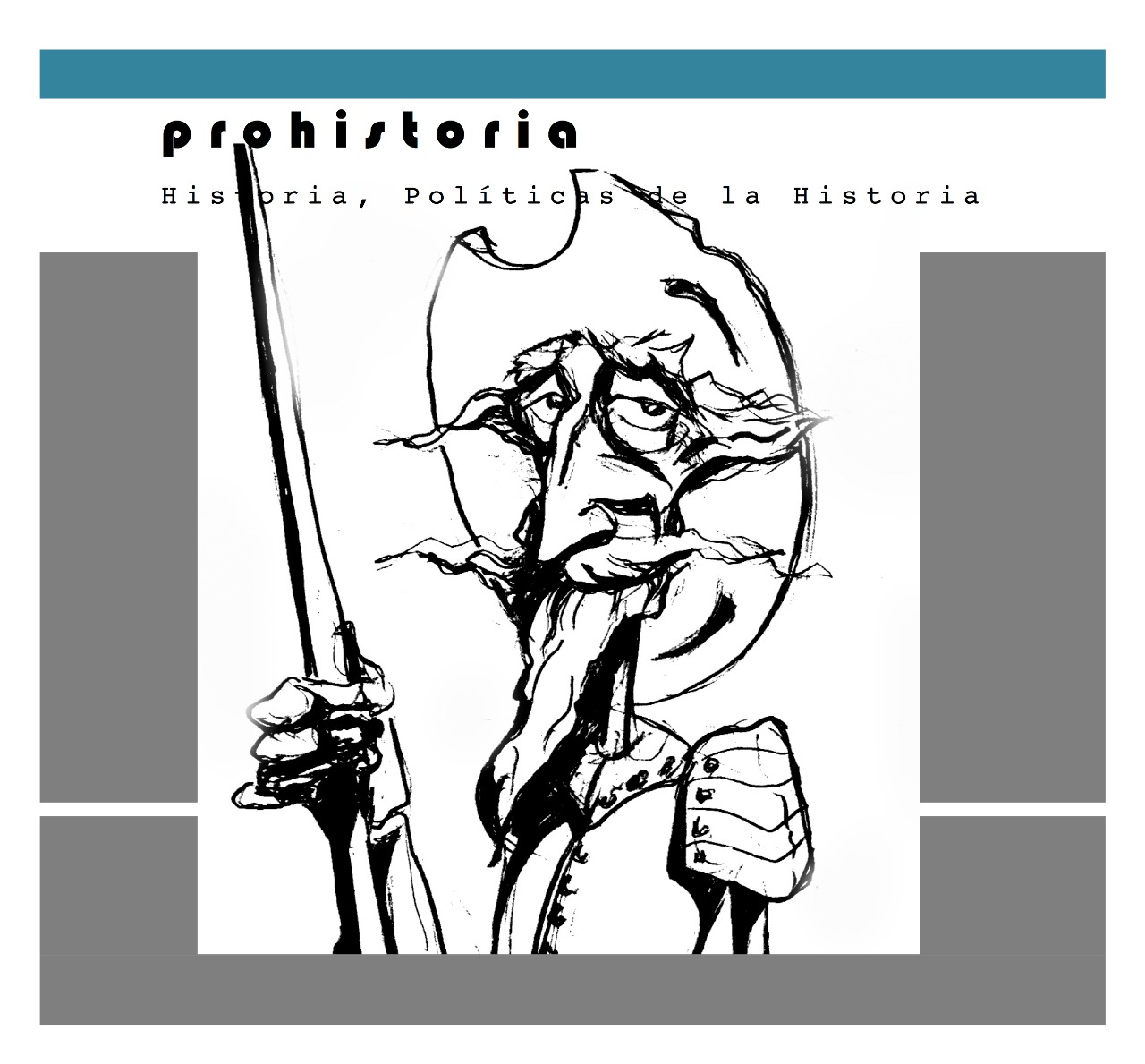Decision for intuition and decision for representation
Georges Sorel and Carl Schmitt facing the crisis of Rule of Law
DOI:
https://doi.org/10.35305/prohistoria.vi40.1848Keywords:
Georges Sorel, Carl Schmitt, decisionism, vitalism, Rule of LawAbstract
In this article I review Schmitt's references to Sorel, trying to demonstrate that where Schmitt pretends to agree with Sorel (mostly in the criticism of the Rule of Law), significant philosophical differences nevertheless persist. To this end, I disaggregate decisionism into three analytical dimensions (juridical, gnoseological and theologico-political), finding opposite positions in each of them: (a) while for Schmitt “State proves that to produce law it need not be based on law”, for Sorel law rise spontaneously and outside the State; (b) while for Schmitt decisionism means "decision for representation", for Sorel it expresses "decision for intuition"; and (c) while for Schmitt this decision is analogous to a miracle, for Sorel it only goes along with the providential cycles of the rise and decline of culture.
Downloads
References
Bergson, H. (1889). Essai sur les données immédiates de la conscience. Felix Alcan.
Bergson, H. (1960 [1903]). Introducción a la metafísica. UNAM.
Berlin, I. (2005). Prefacio. en Georges Sorel, Reflexiones sobre la violencia. Alianza.
Bertelloni, F. (2002). Antecedentes medievales del caso de excepción de Carl Schmitt. En J. Dotti J. y J. Pinto (Comps.), Carl Schmitt, su época y su pensamiento (pp.31-42). Eudeba.
Bochenski, I. (1969). La filosofía actual. Fondo de Cultura Económica.
Brandom, E. (2017). Violence in translation. Georges Sorel, liberalism and totalitarianism from Weimar to Woodstock. History of political thought, 38(4), 733-763.
Breuer, S. (1996). Burocracia y Carisma. La sociología política de Max Weber. Edicons Alfons El Magnànim.
Chun, S. (2016). Benjamin y Schmitt leen Reflexiones sobre la violencia de Sorel. Daimon, 67, 99-115.
Ciria, A. (1993). Georges Sorel. CEAL.
Ciuro Caldani, M.A. (1979). Reflexiones sobre la ley y la costumbre. Jurisprudencia Argentina, Tomo IV, 788-797.
Cristi, R. (1991). Hayek, Schmitt y el Estado de Derecho. Revista Chilena de Derecho, 18(2), 189-201.
Dotti, J. (2011). Notas complementarias a Carl Schmitt: Ética del Estado y Estado pluralista. Deus Mortalis, 10, 309-524.
Duguit, L. (1921). Traité de Droit Constitutionnel, en tres vols. Fontemoing & Cie.
Duguit, L. (1923). Traité de Droit Constitutionnel, en cuatro vols. Fontemoing & Cie.
Freund, J. (2014). Una interpretación de Georges Sorel. En Georges Sorel, La descomposición del marxismo (pp. 3-28). Godot.
Galati, E. (2015). La costumbre en el derecho argentino. Teseo y UAI.
Galli, C. (2018). Genealogía de la política. Carl Schmitt y la crisis del pensamiento político moderno. Unipe.
Gervasoni, M. (1996). La liberté, l'État et les associations. Alexis de Tocqueville et Georges Sorel. Mil neuf cent. Revue d'histoire intellectuelle, 14, 139-158.
Goldschmidt, W. (1987). Introducción filosófica al derecho. Depalma.
Goriely, G. (1962). Le pluralisme dramatique de Georges Sorel. Rivière.
Herrera, M. (1998). Carl Schmitt, el marxismo. Res publica, 2, 35-68.
Ingold, A. (2014). Penser à l’épreuve des conflits. Georges Sorel ingénieur hydraulique à Perpignan. Mil neuf cent. Revue d'histoire intellectuelle, 1(32), 11-52.
Jennings, J.R. (1985). Georges Sorel. The character and development of his thought. Palgrave Macmillan.
Kelsen, H. (2008 [1934]). Teoría pura del derecho. EUDEBA.
Kervégan, J.F. (2007) Hegel, Carl Schmitt. Lo político: entre especulación y positividad. Escolar y Mayo.
Lenin, V. (2003 [1918]). El Estado y la revolución. Ágora.
Lenin, V. (1978 [1902]): ¿Qué hacer? Akal.
Lenin, V.I. (1977 [1908]. Materialismo y empiriocriticismo. Obras Completas, t.14. Akal.
Löwith, K. (1973). El sentido de la historia. Aguilar.
MacIntyre, A. (1987). Tras la virtud. Crítica.
Marucco, D. (1984). El sindicalismo. En A. Pizzorno et al., Historia de las ideas políticas, económicas y sociales (pp. 77-123). Folios.
Meisel, J. (1975). El mito de la clase gobernante. Amorrortu.
Meisel, J. (1950a). Georges Sorel’s Last Myth. The Journal of Politics, 12(1), 52-65.
Meisel, J. (1950b). A Premature Fascist? Sorel and Mussolini. The Western Political Quarterly, 3(1), 14-27.
Novaro, M. (2000). Representación y liderazgo en las democracias contemporáneas. Homo Sapiens.
Pareto, V. (1935). The Mind and Society. Dover.
Pascucci, E. (1994). G.B. Vico: el establecimiento del orden natural a través de la noción de Providencia. Tesis doctoral. Universidad Complutense de Madrid.
Rolland, P. (2005). Sorel et le “moment syndical” de la pensée du droit. En C. Herrera (Dir.), Georges Sorel et le droit (pp. 55-81). Kimé.
Rossi, L.A. (1999). "El mito más fuerte reposa sobre lo nacional". Carl Schmitt, Georges Sorel y "El concepto de lo político". Revista internacional de filosofía política, 14, 147-166.
Sampay, A. (1996). Introducción a la Teoría del Estado. Theoria.
Sampay, A. (1942). La crisis del Estado de Derecho liberal-burgués. Losada.
Sánchez Abelenda, R. (1969). La teoría del poder en el pensamiento político de Juan Donoso Cortés. Eudeba.
Schmitt, C. (2014 [1921]). Dictatorship. Polity Press.
Schmitt, C. (2001a [1922]). Teología política. En H. Orestes Aguilar (ed.). Carl Schmitt, teólogo de la política. Fondo de Cultura Económica.
Schmitt, C. (2011a [1923]). Catolicismo romano y forma política. Tecnos.
Schmitt, C. (2001b [1923]). La teoría política del mito. En H. Orestes Aguilar (ed.). Carl Schmitt, teólogo de la política. Fondo de Cultura Económica.
Schmitt, C. (2001c [1932]). El concepto de lo político. En H. Orestes Aguilar (ed.). Carl Schmitt, teólogo de la política. Fondo de Cultura Económica.
Schmitt, C. (2011b [1930]). Ética del Estado y Estado pluralista. Deus Mortalis, 10, 287-307.
Schmitt, C. (2006 [1928]). Teoría de la Constitución. Alianza.
Schwab, G. (1989). The challenge of the exception. Greenwood Press.
Sorel, G. (1981a [1921]). Matériaux d'une théorie du prolétariat. Slatkine.
Sorel, G. (1981b [1908]). Les illusions du progrès. Slatkine.
Sorel, G. (1901). L’avenir socialiste des syndicats. Librairie G. Jacques & Cia.
Sorel, G. (2005[1908]). Reflexiones sobre la violencia. Alianza.
Sorel, G. (1958). ¿Qué es el sindicalismo? En G. Sorel, E. Berth, H. Lagardelle, V. Grifuelhes, Teoría y práctica del sindicalismo (pp. 21-35). Guillermo Dávalos.
Sorel, G. (1905). Conclusion aux “Enseignements sociaux de l’Economie moderne”. Le mouvement socialiste, 158, 289-299.
Sorel, G. (1896 [2020]). Study on Vico. Brill.
Sorel, G. (1921). De l’utilité du pragmatisme. Marcel Rivière.
Sternhell, Z. (1994). El nacimiento de la ideología fascista. Siglo XXI.
Vico, G. (1995 [1744]). Ciencia Nueva. Tecnos.
Werner Müller, J. (2003). Myth, law and order: Schmitt and Benjamin read reflections on violence. History of European Ideas, 29(4), 459-473.
Published
How to Cite
Issue
Section
License
Copyright (c) 2023 Jonás Chaia De Bellis

This work is licensed under a Creative Commons Attribution-NonCommercial-ShareAlike 4.0 International License.
- Authors retain copyright and grant the journal right of first publication with the work simultaneously licensed under Creative Commons Attribution 4.0 International License.
- Authors are able to enter into separate, additional contractual arrangements for the non-exclusive distribution of the journal's published version of the work (e.g., post it to an institutional repository or publish it in a book), with an acknowledgement of its initial publication in this journal.
Copyright of this issue © Prohistoria. Historia, políticas de la historia



















